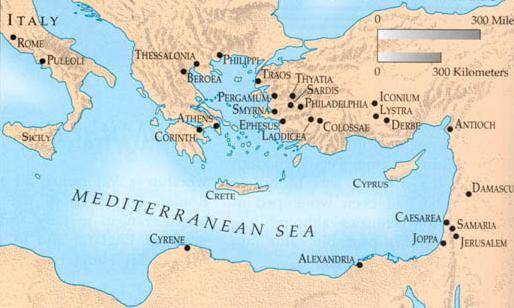To first-century Christians, it was observed in a very real and 'recent' sense, not a hurried and presumptuous manner.
Originally, all Christians were Jews. And to them, Jesus was the fulfillment of a direct promise to them, that a deliverer would
be sent by God, to mediate the relationship they had with God, their
"father".
It is clear that their ancestors understood the need for a superior 'legal basis' to be established, which could temporarily offset their deficiencies and corrupt tendencies, so that they could freely approach God- who was clean, just and sacred to them.
This would require something more effective, than the mediation of corrupted, human intercessors, who were considered a short-term, temporary solution, that could not literally offset such corruption, nor open the door to the expectation of becoming "righteous", themselves, so that- long term- no offsetting feature would even be required; so that indefinite "life" and "righteousness" could actually be attained, based on merit- that is, 'loyalty to' and 'love for' God, would be sufficient to establish the basis for God's desire to grant indefinite "life", that could be extended, yet was unhindered by continued sinful action. And the value of Christ's life- sacrificed at his death- would forever blot out past sinful behaviors, that might prevent the goal of human "righteousness" from being achieved.
Jesus, then, was not the 'end', but the 'means' to life; for the Jewish Christian. ...who understood these matters, well; having reviewed them from childhood.
It was necessary for the Gentile Christian to be reeducated before being permitted to become a disciple of Christ, although no gentile was invited to enter the Christian Congregation for some 3 1/2 years, following Jesus' death. Having a basic- yet serious- understanding of their new heritage and the events leading up to the death of Christ, also involved comprehending why the Christian had to remain distinguishable from the "nations", and why gentile religious philosophy, concept and festival, had to be set aside, before becoming Jesus' disciple.
First-century Christians were happy to do this, and the process did not change, until the 3rd and 4th-century, when European Christians- who were essentially entirely gentile in composition- began to disregard the process, and retain gentile religious views, and increasingly sew them into the fabric of Christian teaching; which altered their view of Jesus and his ministry, radically.
First-century gentile Christians expressed great elation and delight, at what they learned about the "inheritance", the messianic promise and Daniel's "holy ones", who belonged to the "Lamb".
Having thoroughly abandoned their previous religious views- and agreed to not return to them, or begin blending them into the framework of their new Judaic Christian heritage- they viewed themselves as having received an adoption by the God of the Jews, and (finally understanding that a "mediator" was required for corrupted humans to approach, relationship and serve God) enjoyed the expectation that Jesus, having given his life to provide the divine legal basis for that arrangement, was worthy serve as the master of their discipleship.
This involved developing a deep, spiritual awareness that relied on God's "holy spirit", to help ones- who previously had no background in such matters- fully understand, and comply with.
The nations of Israel and Judah had been "set apart" for "sacred service" to "Jehovah", which is an important point to realize, since the gentile
world had little or no understanding of this; but presumed to think that the "Messiah" came- and died- to save immortal human souls; a gentile concept.
How many born in and living in the 4th-century "western world", could even relate to any other concept, which had been one of the first things that a gentile Christian would've abandoned. For like their Jewish brothers and sisters, these early-Christians embraced the
Judaic understanding that they were mortal, and that salvation was a precious assurance for the faithfully loyal, but was still a matter of future reception.

The early-Christian Congregation as a whole, understood the
relationship between Daniels "holy ones" (Dan.7:22), and the Messiah,
and the responsibility that went along with that relationship (Rev.1:6, 1 Peter 2:5, Rev.20:6, Rev.5:9,10). The trauma of Christ's death was offset by the assurance that it provided to the "holy ones", that they would indeed become "equipped" (2 Timothy 3:17) to play an important role in the deliverance of the human family, from the effects of its departure, from Jehovah's direction.
These prophetic realities were far more serious in tone and dignity, than the self-oriented concepts that did not reflect Judaic Christianity; and that originated within the lands of ancient Babylon and its satellites.
Jesus' death finally opened the door for the "holy ones' to "receive" the "kingdom", which would- in its proper time- deliver the entire earth; environment, animal and human- from the effects of disloyalty and disinterest, that obscured the assured expectation of indefinite "life", purpose and happiness.
"But the holy ones of the Supreme One will receive the kingdom, and they will possess the kingdom forever, yes, forever and ever."- Daniel 7:18
